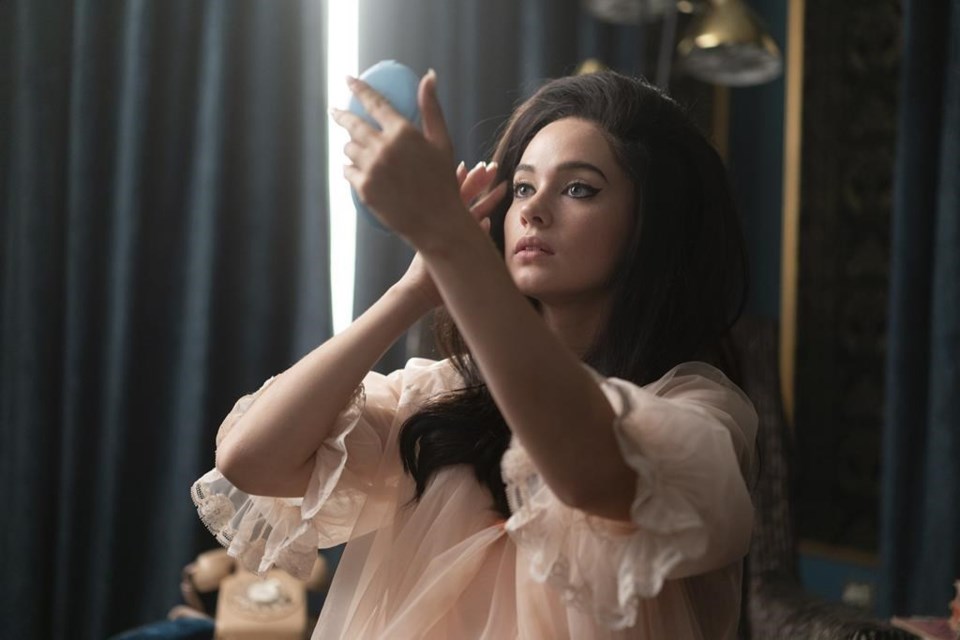Dreamily gazing at the album covers of Elvis Presley was not, statistically speaking, a rare habit among American teen girls in the late 1950s and early ’60s.
But for Priscilla Beaulieu, teenage fantasy became a strange and surreal reality. Sofia Coppola’s “Priscilla,” starring Cailee Spaeny, captures all the dreaminess, the absurdity and, finally, the nightmare of falling in love with Elvis.
Priscilla was just 14 years-old — a 9th grader — when she first met him. It was 1959. She was living in West Germany, where her Air Force officer stepfather was stationed. The swoony early scenes of Coppola’s film find a solitary Priscilla sipping soda in a Navy base diner while a cover of Frankie Avalon’s “Venus” (“Venus, make her fair / A lovely girl with sunlight in her hair”) plays around her.
A man approaches and asks if she likes Elvis. Of course she does. Would she like to meet him? Um, what? After some negotiations with her parents, Priscilla is sitting there on the sofa at a small party when the King of Rock ‘n’ Roll, himself (Jacob Elordi), strolls down the stairs. Big, big sigh.
Coppola, the writer-director of “The Virgin Suicides,” “Lost in Translation” and “Somewhere,” has always been innately attuned to the forming identities, swelling desires and intimate revelations of young women. In the story of Priscilla Presley (the film is based on her 1985 memoir, “Elvis and Me” ), Coppola has found a tale tailor-made for her delicately perceptive style of filmmaking.
As a movie, “Priscilla” is the diametric opposite of Baz Luhrmann’s “Elvis.” Where Luhrmann’s film was lurid and careening, Coppola’s is muted and textured. Her film is a kind of fairy tale that turns claustrophobic and cautionary.
“Priscilla” is, at least at first, quite funny. After Priscilla initially catches Elvis’ eye at that party, she’s back at school learning about the food groups. How could anyone possibly stomach that? Or when, after Elvis hasn’t called following his stint in the military, Priscilla’s mother asks her if there aren’t any boys in school she might be interested in, instead. Priscilla doesn’t need to say anything; just the image of lining up your average 9th grade boy against Elvis Presley is enough.
Yet their courtship continues in somewhat traditional fashion. Elvis, played with relaxed magnetism by Elordi (“The Kissing Booth,” “Saltburn”), is drawn to Priscilla because she reminds him of home; it’s clear her purity is part of her appeal to him. It’s a long time before they have sex, though her youth remains tacitly problematic. “Wow, she’s young,” says one woman watching Elvis lead Priscilla upstairs. “Like a little girl.”
Their life together is initially sweet if deranged. Priscilla drifts through a dream world even if Elvis’ extremes are glaring to us. His bedroom in Graceland is comically gaudy. “I got this for you,” we hear Elvis say kindly, before a handgun is handed over.
No Presley songs play in “Priscilla.” (While Priscilla Presley is an executive producer, the Elvis estate didn’t participate in the film.) But it does share a telling track ( Carl Orff’s “Gassenhauer” ) with Terence Malick’s “Badlands,” another movie about an underage teen girl (Sissy Spacek) who throws her life in with a charismatic drifter with matinee-idol looks (Martin Sheen).
And like they do for Holly in “Badlands,” things turn increasingly dark for Priscilla. Elvis treats her like a doll he keeps at home while he goes in and out. “It’s either me or a career, baby,” he tells her. Coppola, who dedicates the movie to her mother, Eleanor Coppola, has long specialized in gilded cages (“Marie Antoinette,” “The Bling Ring”). Graceland turns out to be a prison to Priscilla.
There aren’t many false notes in Coppola’s richly layered film, handsomely shot by Philippe Le Sourd, with sumptuous production design from Tamara Deverell and fine, toned-down costumes by Stacey Battat.
But “Priscilla” fades where “Elvis” found its footing. When Presley’s downturn accelerates in Las Vegas, Luhrmann’s movie swelled with tragedy. In the same time period here, Priscilla awakens. Yet it feels underdeveloped, coming too quickly, in a sudden rush — albeit a terrific rush, with Dolly Parton playing.
A constant throughout, though, is Spaeny. This is a deft breakthrough performance perfectly poised between youthful fantasy and adult reality.
“Priscilla,” an A24 release, is rated R by the Motion Picture Association for drug use and some language. Running time: 113 minutes. Three stars out of four.
___
This review has been updated to remove a reference to the band Phoenix covering the Frankie Avalon song “Venus.” Phoenix served as musical supervisors on the film but the cover is performed by by Sons of Raphael.
Jake Coyle, The Associated Press


